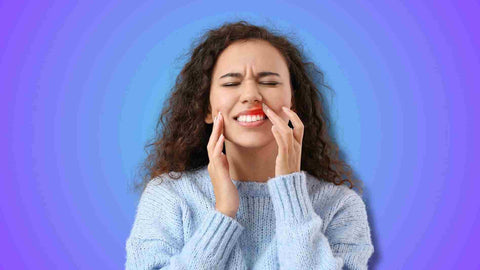Is Wine Bad for Your Teeth?
At a high level: yes, wine is bad for your teeth. If we get more nuanced - wine, particularly red wine, can have both positive and negative effects on your teeth, making it a bit of a double-edged sword in terms of oral health.
On the negative side, wine's acidity can pose a risk to your teeth by softening the enamel, the hard, protective outer layer of your teeth. This acid erosion makes teeth more susceptible to decay and can increase sensitivity.
Additionally, red wine is known for its potential to stain teeth due to its rich color and tannin content, which can adhere to the enamel and lead to discoloration over time.
However, red wine also contains polyphenols, which have been studied for their potential oral health benefits, including reducing the risk of gum disease and fighting harmful bacteria in the mouth. These antioxidants can help protect the gums and may inhibit the growth of bacteria that cause cavities and dental plaque.
In this article, I'll explain everything you need to know about the effects of wine on your teeth.
So, how does wine affect your teeth?

Drinking wine can be a delightful experience, but it's important to be aware of how it affects your dental health.
Red wine, with its rich color and complex flavors, also brings the potential for staining your teeth. This happens because of chromogens, pigmented compounds that cling to your enamel, and tannins, which make it easier for these pigments to stick.
While red wine boasts some antibacterial properties that may fight harmful oral bacteria, these benefits must be weighed against the risk of staining and the acidic nature of wine, which can erode tooth enamel over time.
White wine, though not a culprit for staining in the same way as red, poses its own challenges due to its higher acidity. This acidity can weaken your tooth enamel, making your teeth more prone to decay and sensitivity.
Also, the etching effect of white wine's acidity can roughen your enamel, making it a prime surface for other staining agents to latch onto.
Is red wine bad for your teeth?

Red wine, while celebrated for its potential health benefits, does pose certain challenges to dental health, primarily due to two factors: its acidity and its tendency to stain teeth.
The acidity in red wine can contribute to the erosion of tooth enamel, the hard, protective outer layer of your teeth. Over time, this tooth erosion can lead to increased sensitivity and a higher risk of cavities, as enamel becomes thinner and less capable of protecting the tooth's inner layers.
Additionally, red wine contains chromogens and tannins, compounds that are known for their strong pigmentation and ability to bind to dental enamel, respectively. This combination makes red wine a common culprit for tooth staining, leading to a duller or yellowed appearance of the teeth.
However, it's also worth noting that red wine has been found to possess antibacterial properties that may benefit oral health by reducing the presence of certain harmful bacteria in the mouth.
To enjoy red wine without unduly compromising your dental health, we recommend practicing good oral hygiene, including regular brushing with nano hydroxyapatite toothpaste and flossing with expandable dental floss.
Is white wine bad for your teeth?

White wine, while celebrated for its crisp flavors and versatility, does pose certain risks to your dental health, primarily due to its acidity.
The high acid content in white wine can contribute to the erosion of tooth enamel, the hard, protective outer layer of your teeth.
Enamel erosion makes teeth more susceptible to decay, increases sensitivity to hot and cold, and can lead to a duller, more yellow appearance as the enamel thins and the underlying dentin becomes more visible.
Additionally, the acidic nature of white wine can exacerbate the effects of other staining foods and drinks, making your teeth more prone to discoloration indirectly.
However, it's important to note that moderate consumption for wine drinkers, coupled with good oral hygiene practices, can mitigate these risks. For example, rinsing your mouth with water after enjoying a glass of white wine can help neutralize the acids, and waiting at least 30 minutes before brushing your teeth can prevent further enamel erosion.
Benefits of Wine for Your Teeth

Red wine, often celebrated for its rich flavors and potential health benefits, might also offer some advantages for your oral health, thanks to its polyphenol content.
These natural compounds, particularly abundant in red wine, have shown promise in fighting off harmful bacteria in your mouth, such as Streptococcus mutans, which is a main culprit behind tooth decay and cavities.
By potentially reducing the bacteria's ability to stick to your teeth, red wine could play a role in lowering your risk of dental issues. Moreover, the anti-inflammatory properties of antioxidants like resveratrol found in red wine may help combat gum disease, keeping your gums healthier and reducing the risk of periodontal problems.
Side Effects of Wine for Your Teeth

While wine, particularly red wine, may offer some benefits due to its polyphenol content, there are notable side effects to consider regarding your dental health:
-
Teeth Staining: Red wine is infamous for its ability to stain teeth. The intense color pigments called chromogens, combined with the wine's acidity, cling to the tooth enamel, leading to noticeable discoloration over time. White wine, though less likely to stain than red, can still contribute to staining by etching the enamel and making it more susceptible to stains from other foods and drinks.
-
Acid Erosion: Both red and white wines are acidic. Regular exposure to acidic beverages can soften and gradually wear away the tooth enamel. This erosion not only increases the risk of decay and cavities but can also lead to tooth sensitivity, especially when consuming hot or cold foods and drinks.
To mitigate these side effects, it's important to adopt practices that can help protect your teeth.
Drinking water alongside or after your wine can help rinse away acids and pigments, reducing their impact on your teeth. Using a straw for white wine can minimize contact with your teeth, though it's less practical for enjoying red wine.
Chewing sugar-free gum after drinking wine can also stimulate saliva production, helping to neutralize acids and re-mineralize the enamel.
Most importantly, maintaining a consistent oral hygiene routine, including brushing with nano hydroxyapatite toothpaste and flossing daily - can help keep your teeth strong and healthy, allowing you to enjoy wine without compromising your dental health.
How to Avoid Wine Stains on Your Teeth

Avoiding wine stains on your teeth involves a few strategic habits that can help maintain a bright smile without having to give up your favorite beverage. Let's walk through some of them now.
Rinse with Water
After enjoying a glass of wine, make sure to rinse your mouth with water. This simple step helps wash away tannins and pigments that cause staining before they have a chance to settle on your teeth.
Use a Straw
When possible, drink wine through a straw, even if it looks odd. This method reduces the amount of liquid that comes in contact with the visible front surfaces of your teeth.
Maintain Good Oral Hygiene
Brush your teeth at least twice a day with nano hydroxyapatite toothpaste and use expandable dental floss daily. You can also consider using a whitening toothpaste, though some dental professionals consider it bad as it can erode away enamel.
Thankfully, regularly brushing with nano hydroxyapatite toothpaste helps remove surface stains and prevents them from setting in without causing damage. Plus, remineralizing toothpaste can prevent tooth decay which can also cause the appearance of tooth stains.
Professional Dental Cleanings
Of course, it's important to see a dentist regularly for a professional cleaning. Your dentist or hygienist can remove surface stains more effectively than at-home care and can offer advice or teeth whitening treatments to further reduce staining.
You can also consider using natural whitening strips at home as needed for a quick, effective way to remove stains from wine.
Frequently Asked Questions
Does wine mess up your teeth?
Yes, wine can potentially cause dental issues if consumed excessively or without proper oral care. Both red and white wines contain acids that can weaken tooth enamel over time, making teeth more vulnerable to staining and decay. Additionally, the tannins in red wine can contribute to tooth discoloration. However, moderate consumption paired with good oral hygiene practices like regular brushing, flossing, and dental check-ups can help mitigate the effects of wine on teeth. Rinsing your mouth with water after drinking wine can also help reduce its impact on dental health.
Which wine is worse for teeth?
Red wine tends to be worse for teeth compared to white wine. This is because red wine contains higher levels of tannins and chromogens, which can lead to more pronounced staining of the teeth. Additionally, red wine is often more acidic than white wine, which can contribute to enamel erosion over time if consumed frequently. However, regardless of the type of wine, it's essential to practice good oral hygiene habits such as brushing with nano hydroxyapatite toothpaste and flossing regularly to minimize any potential dental issues.
What alcohol is least damaging to teeth?
Generally, clear spirits like vodka and gin are considered the least damaging to teeth compared to other types of alcohol. This is because they contain fewer sugars and are less acidic, reducing the risk of enamel erosion and tooth decay. However, it's still important to drink alcohol in moderation and maintain good oral hygiene practices to minimize any potential dental damage. Additionally, consuming alcohol with plenty of water and avoiding sugary mixers can further help protect your teeth.
Do I need to brush my teeth after wine?
Yes, it's advisable to brush your teeth after consuming wine. Wine, particularly red wine, contains acidic components that can weaken tooth enamel over time, leading to increased susceptibility to staining and decay. Brushing your teeth helps remove any residual wine particles and acidity, reducing the risk of dental damage and maintaining oral hygiene. Additionally, rinsing your mouth with water after drinking wine can also help mitigate its effects on your teeth if brushing immediately isn't possible.
How can I protect my teeth from wine?
To protect your teeth from wine, moderation is key. Limit your consumption to reduce exposure to its acidic and staining properties. Additionally, consider using a straw to minimize direct contact between the wine and your teeth. After drinking, rinse your mouth with water to help neutralize acids and remove residue. Remember to maintain good oral hygiene by brushing twice a day, flossing daily, and visiting your dentist regularly for check-ups. These simple steps can help safeguard your teeth while enjoying your favorite wine.
What happens if you don't brush your teeth after drinking alcohol?
If you don't brush your teeth after consuming alcohol, particularly beverages like wine, the sugars and acids present in the alcohol can linger on your teeth, promoting bacterial growth and plaque formation. This can lead to an increased risk of tooth decay, gum inflammation, and enamel erosion over time. Neglecting oral hygiene post-alcohol consumption can exacerbate these effects, potentially resulting in cavities, gum disease, and other dental issues. Therefore, it's important to prioritize brushing your teeth after drinking alcohol to maintain oral health and prevent long-term dental problems.






















